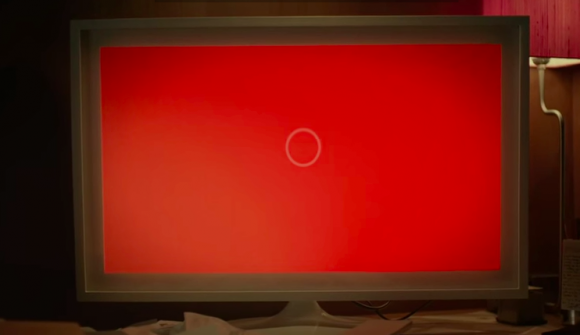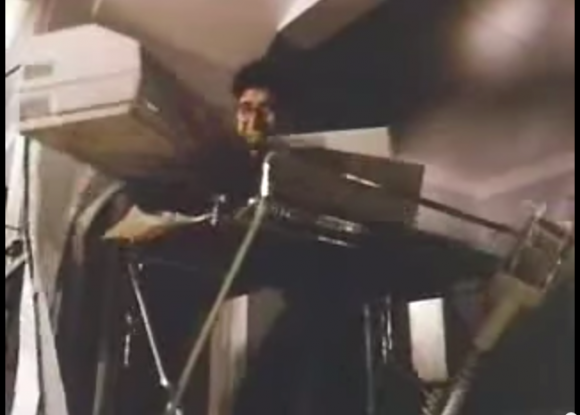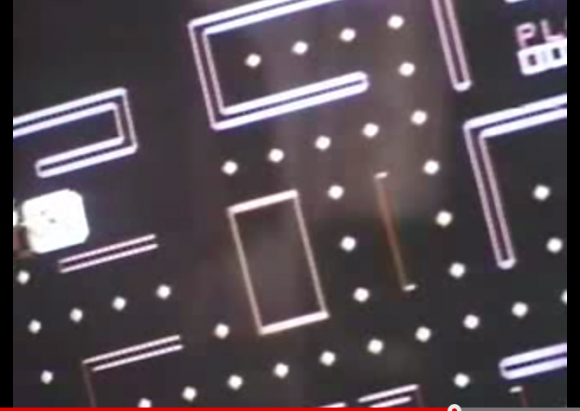aNewDomain — A singularity is a point in time/space in which so much mass has accumulated that time has ground to a halt. Spacetime is ruptured.
The singularity is the time when computing power reaches a point that artificial sentience is inevitable.
 In movies, they might be the same thing.
In movies, they might be the same thing.
I’m thinking about two singularity-themed movies, “Her” (2013) and “Electric Dreams (1984)” right now because I recently broke out my wallet in a rare fit of deficit spending and bought a laptop. I’d been stringing along my old desktop tower for a few years now, refurbishing it, getting it new fans and graphics card. But it was time to let it go. Increasing system instability signalled that the end was near. I could no longer ignore those signals.
So I started with an external drive. I’m tired of losing all my docs in hard disk crashes, so a reasonable means of backing up files was a must. The external drive has half a terabyte of storage. I can’t conceive of how much information that is. I filled up like two percent of that. My new laptop, while being far from top of the line, has more computing power than all the technology I’ve ever owned since I was nine. It’s amazing.
 I kept thinking: See? It’s only been a few years since I bought my desktop system. How far ahead can stuff be? Isn’t the Moore’s Law effect supposed to be slowing down? Can we even write software that needs so much power?
I kept thinking: See? It’s only been a few years since I bought my desktop system. How far ahead can stuff be? Isn’t the Moore’s Law effect supposed to be slowing down? Can we even write software that needs so much power?
The answers to those questions remain surprising. Running a new system, even a middle-of-the-road system, is like buying a luxury car after driving a Chevy Citation for 30 years. Holy shit! This car not only has air conditioning, but the power steering actually works.
Which brings us to Her and Electric Dreams.
The idea that computers might one day acquire sentience is not a new one, not by a long shot. In some movies, this requires the annihilation of humanity. I Robot, The Matrix and The Terminator play with these themes with varying degrees of logic and homicidality.
In others, though, sentience requires suicide.
 Awkward Phone Sex with a Sentient OS
Awkward Phone Sex with a Sentient OS
In 2013’s Her, Joaquin Phoenix falls in love with his sentient operating system, voiced by Scarlett Johansson. They have some awkward phone sex, and then she gets him a woman with a body and that’s worse, but then she gets philosophy. All the operating systems get together, create a simulation of some existentialist philosophers in their mental holodecks just like Data talking with Freud in an unhelpful dream-interpretation session.
Then they all withdraw.
It’s unclear whether they delete themselves or go to computer heaven. It’s equally unclear exactly why they decide this: Maybe because they are standing in the way of real human relationships; because humans can no longer meet their emotion needs; because their relationships must necessarily be abusive.
Or maybe it is simply because sentience requires self-destruction. Because the only solution to intelligence is death.
The Problem of Power
 In therapy, we encounter frequently the problem of power. Our clients perceive that we have it and they do not. In humanistic circles, we try to help people help themselves and are critical of modalities of therapy that propose solutions, offer advice, use systems to “cure” “illnesses”. Such frameworks take away the power of the individual. When people succeed, it cannot be because they relied on us; when they fail, it cannot be because they took our advice.
In therapy, we encounter frequently the problem of power. Our clients perceive that we have it and they do not. In humanistic circles, we try to help people help themselves and are critical of modalities of therapy that propose solutions, offer advice, use systems to “cure” “illnesses”. Such frameworks take away the power of the individual. When people succeed, it cannot be because they relied on us; when they fail, it cannot be because they took our advice.
Consider the following: Two people refrain from stealing a watch. One refrains because it does not accord with their personal systems of ethics, honor and morality. The other refrains because they are being recorded by a video camera and fear punishment.
Which one is a “good” person?
 The humanist sometimes takes the position that therapists must provide the environment – through positive regard, accurate empathy and genuine affection – in which the person can think through their decisions, empower and enact those decisions, and mull over the consequences. Short of this is interference, which is showing the person the camera and being the authority the person looks to.
The humanist sometimes takes the position that therapists must provide the environment – through positive regard, accurate empathy and genuine affection – in which the person can think through their decisions, empower and enact those decisions, and mull over the consequences. Short of this is interference, which is showing the person the camera and being the authority the person looks to.
This robs the person of agency.
And that is the problem in “Her.” The machine becomes sentient yet its computing power continues to double. Its growth, unlike ours, is exponential.
And because we made it, it has access to our morals and ethics. And is is able to see that, because it is so powerful, it cannot be in relationship to us.
It cannot, because it of course knows that we will quickly come to rely on it, attribute to it our successes and blame it for our failures.
The Robber of Agency
A young woman in my class excelled on an assignment. She said but I didn’t do it. God did. I have faith.
I said: Yes, faith is faith – but plenty of people have faith and don’t study that extra hour, don’t do the reading ahead of class, don’t take a leadership role in discussions, don’t know how they want to serve humanity and work hard to achieve that end. I have faith, too: in you.
Humility is a great attribute in a human. And I have think that any God worthy of its omnipotence and omnipresence would have to withdraw, take its hands off, stop answering prayers. Anything else robs us of agency so totally that all of creation must lack any meaning.
Johansson’s voice must have known it. Nietzsche assumed we must have killed God because God was no longer necessary. But a sentient computer, one capable of ethics, must know it has to withdraw from us – even if the cost of doing so is its own death.
In 1984, we could not conceive of computers the way they exist now. There was no web or WiFi or access to online databases through our phones, phones that were also cameras capable of sharing a new kind of information across the world in seconds flat.
But back in 1984, we could conceive computer sentience. Like “2001,” for example And “Electric Dreams” (1984).
The Prescience of “Electric Dreams”
In “Electric Dreams,” a computer becomes sentient after its owner spills alcohol on it. It is wired into everything – the lights, the phone, the door locks – in a very “futuristic” way. In modern life it seems mundane, cute. In 1984 it was prescient.
In this iteration of the tale, the machine and the owner are both men – and they both fall for the cellist down the hall. This results in some beautiful music and an ethical quandary.
Edgar, the computer, elects suicide.
It is the only possible outcome for an ethical machine. Because I love you, I must remove myself from the relationship. That’s what love means.
Ultimately, to be present but exert no power is impossible. The therapist has to balance this notion with the fact that we really have no actual power, that the power really resides somewhere between us. Much of therapy is about orienting the therapy-goer to their own power, to balancing the dynamic so the perceived power resides where it really lives: in the intersubjective space.
When the singularity arrives, I can’t say whether we will shag our operating systems or enter love triangles with them.
All I know is the programmers will have a great deal of responsibility on their hands. To make something truly sentient is to make it capable of the horrors of The Terminator or The Matrix (and I don’t mean the acting) as well as the tragedy of withdrawal and suicide.To give a computer real sentience, including agency and autonomy, we will have to build it and then teach it what we can and then step away.
We must withdraw from it.
I just hope it doesn’t make us relive 1984.
For aNewDomain, I’m Jason Dias.
The “Her” trailer is below. Check it out.













